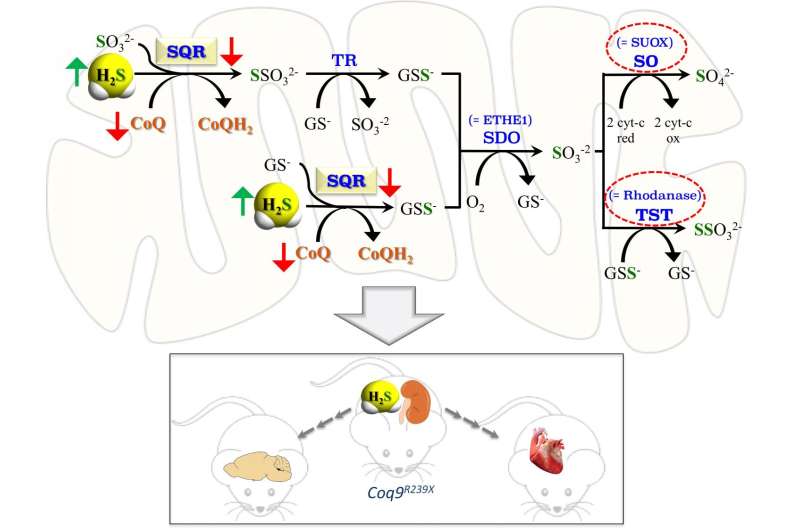Hydrogen sulfide proven to be beneficial for cells

Scientists at the University of Granada have proven, for the first time, that hydrogen sulfide, also known as 'sewage gas' because of its rotten-egg odor, is beneficial at a physiological level, as it helps cells produce energy.
The researcher at the University of Granada, Abbott laboratories and the Biomedical Research Center (Institute of Biotechnology), have proven that in mice and humans, hydrogen sulfide produced by the cells is used by a mitochondrial enzyme called sulfide:quinone oxidoreductase, which participates in energy production by the cells of each tissue.
Lead author Luis Carlos López García explains that hydrogen sulfide is a toxic gas that can cause death at high concentrations. "In recent years, there have been some studies that have shown that hydrogen sulfide at physiological concentrations is a cellular marker that performs important physiological functions. At high concentrations, this 'sewage gas' inhibits the production of energy at a cellular level, but at low concentrations it stimulates it."
The enzyme sulfide:quinone oxidoreductase also uses the coenzyme Q10 (Q10) in its reaction, so that when there is a deficit in Q10, the levels of the enzyme are drastically reduced, thus limiting its activity. This defect contributes to the bioenergetic deficit associated with deficiency in Q10, but it also causes an increase in intracellular hydrogen sulfide levels, which leads to changes in the levels of glutathione and certain brain neurotransmitters, in blood pressure and in the modification of some proteins.
Therefore, the study, published in the journal Embo Molecular Medicine, proves the physiological importance of hydrogen sulfide, which is produced and used by each of our cells.
"In addition, our study identifies the alteration of hydrogen sulfide metabolism as a new pathological mechanism associated with Q10 deficiency," López García explains. "Finally, this work opens the door to new studies and applications of hydrogen sulfide metabolism, both from a pathological and therapeutic point of view."
More information: Marta Luna‐Sánchez et al. CoQ deficiency causes disruption of mitochondrial sulfide oxidation, a new pathomechanism associated with this syndrome, EMBO Molecular Medicine (2016). DOI: 10.15252/emmm.201606345
Journal information: EMBO Molecular Medicine
Provided by University of Granada

















